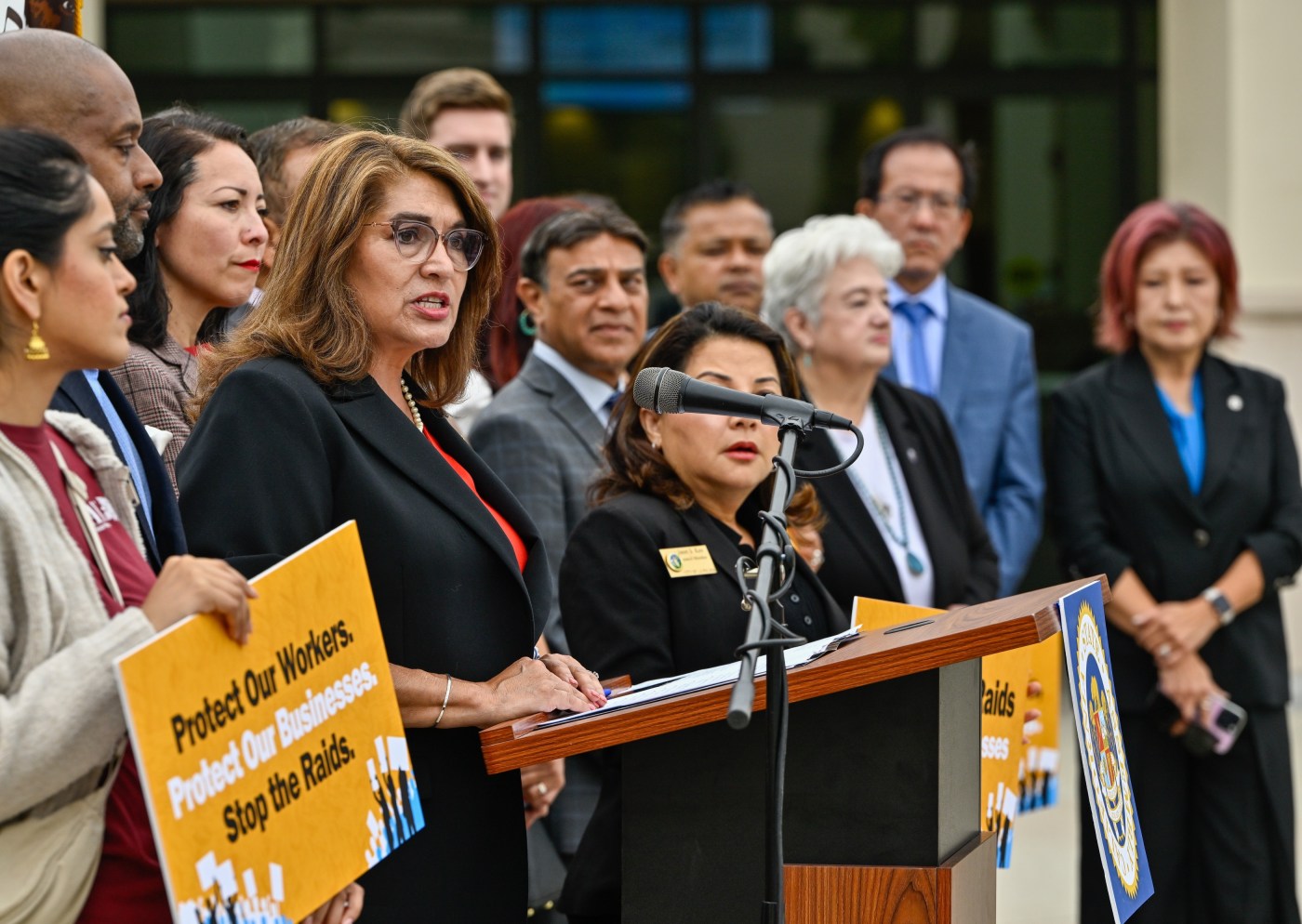The tourism, hospitality and construction industries are critical sectors of the local economy feeling the effects of Immigration and Customs Enforcement activity in communities across northern Orange County, elected officials and community leaders emphasized at a press conference Monday, July 21.
“Something deeply wrong is happening,” Assemblywoman Sharon Quirk-Silva said. “These raids have not made us safer, they’ve made us more afraid. They have pulled parents from homes, workers from job sites and children from classrooms. They have disrupted our economy, shaken our local businesses and left our neighbors living in fear — afraid to open their doors, afraid to show up to work, and afraid to send their kids to school. This is not the California we strive to be.”
Elected officials and local representatives gathering for the press conference held outside Buena Park City Hall, included the city’s mayor, Joyce Ahn, and Fullerton College President Cynthia Olivo, who outlined social and economic impacts of ICE enforcement operations on the industry sectors found in north OC, including Anaheim, Buena Park and Fullerton, as well as small businesses and school attendance rates. Led by Assemblywoman Quirk-Silva, attendees also included Father Dennis Kris of St. Phillip Benizi Church and North Orange County Community College District Chancellor Byron Breland.
“From what we’ve observed, businesses across our region, including hotels, contractors, retailers and restaurants, are reporting immediate challenges. Labor shortages, revenue loss, and heightened anxiety amongst staff,” North Orange County Chamber of Commerce President Andrew Gregson said.
Roughly 200,000 people living in Orange County, an area that relies heavily on immigrant labor, are undocumented. Immigrant workers play a “critical role” in industries such as retail, food supply and healthcare, and are employed in every sector of the county’s workforce, officials said. Their economic contribution is hard to miss, officials said, providing approximately $425 million in state and local taxes every year, according to data prepared by USC Sociology Professor Jody Agius Vallejo for Quirk-Silva’s press conference.
“Those that aren’t compelled by what they’re seeing, the abuse, the excessive force, the civil rights abuses that are happening out there, hopefully will be moved by the fact that our economy is going to suffer. Whether it’s in the construction industry, the hospitality industry … it’s going to be hurt at all levels,” said Second District Supervisor Vicente Sarmiento.
Also, a former Mayor of Santa Ana, Sarmiento continues to represent the city, along with parts of Anaheim, Orange, Tustin, and Garden Grove, on Orange County Board of Supervisors. In those cities, he said, the once bustling streets are emptier, and many small businesses that withstood the pandemic “won’t be able to withstand this.”
Roughly 22% of retail workers in Orange County are undocumented, along with 11% in manufacturing and 14% in construction, according to statistics collected by Vallejo. Anaheim Councilmember Natalie Rubalcava said many businesses are worried about losing employees and customers. She called the ongoing raids at car washes, restaurants and retail locations “the biggest disruption to our economy since the pandemic in 2020.”
“So you may not be directly impacted, you may not know somebody who’s undocumented, but you will feel it, and our economy will feel it,” Sarmiento warned.
Representatives of ICE and the Department of Homeland Security could not be reached for comment.
With an arrest quota that has been reported as high as 3,000 people a day, ICE agents have been “pushed into overdrive,” noted Vallejo, adding that immigration arrests have doubled or tripled in almost every state and detention rates have reached historic highs. Those numbers were recently celebrated in a release shared by the DHS on July 20, in which the agency said a month-long, wide-scale immigration enforcement in Southern California “resulted in arresting some of the worst of the worst criminal illegal aliens.” The ongoing arrests are part of a broader goal by the Trump Administration to secure the country by removing what DHS says are people with violent criminal charges and convictions and reducing illegal border crossings.
The impact of that immigration enforcement activity is also being felt among the children of immigrants, educators and local school districts, Fullerton Elementary School District trustees Vanessa Estrella and Ruthi Hanchett said,
“We’ve heard from students who are afraid to attend class, parents who disappeared from drop-off lines and faculty witnessing the growing silence of a once vibrant classroom,” NOCCD Chancellor Breland said. “We’ve seen, in certain areas, a reduction in enrollment go down as much as 50% in ESL and our adult education courses.”
Quirk-Silva added in an interview Monday that once students return to classrooms, school districts may find that “attendance is way down,” which would impact public schools’ funding based on the average daily attendance. At the federal level, the Department of Education is shutting down several funded programs as well, affecting special education, free school lunches and Head Start preschool programs, another potential hit to local schools, she said.
“There’s going to be big impacts,” said Quirk-Silva. “When you look at the whole picture, it’s not only concerning, but it’s shocking.”










